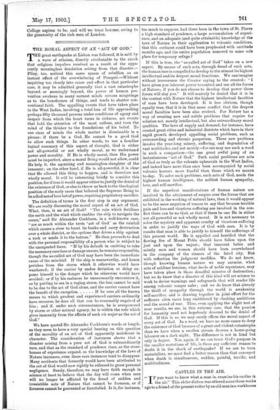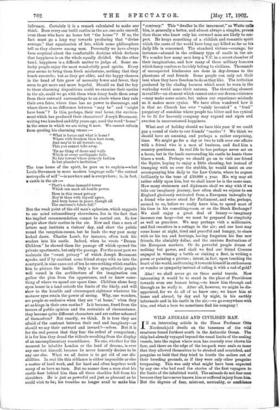CASTLES IN THE AIR.
" TF you want to know what a man is, examine his castles in the air." This obiter dictum was uttered some three weeks ago to a friend of the present writer by an old man in a workhouse
infirmary. Certainly it is a remark caleulated to make one think. Does every one build castles in the air, one asks oneself, even those who have no home but "the house" ? If so, the fact must go a long way towards producing that "divine average," that equalisation of lots, which some philosophers tell us they observe among men. Personally we have always been sceptical about the comfortable doctrine which declares that happiness is on the whole equally divided. On the other band, happiness is a difficult matter to judge of. Some un- lucky people enjoy the most wonderfully good spirits. Every year seems to bring them fresh misfortune, nothing that they touch succeeds ; but as they get older, and the happy chances in the hand of fate grow of necessity fewer and fewer, they seem to get more and more hopeful. Should we find the key to these charming dispositions could we examine their castles in the air, could we go with them when fancy leads them away from their outward surroundings to an abode where they rule their own fates, where time has no power to discourage, and where there is no difference between " may be" and " might have been" ? Is this, perhaps, their real home, the environ- ment which has produced their characters ? Joseph Beaumont, writing two hundred and fifty years ago, used the word "home" in the sense in which we are using it now. We cannot refrain from quoting his charming verses :—
" What is house and what is home ? Where with freedom thou hest room, And may'st to all tyrants say, This you cannot take away.
'Tis no thing of doors and walls Which at every earthquake falls, No fair towers whose princely fashion Is but plunder's invitation."
The true home of the spirit, he goes on to explain—what Louis Stevenson in more modern language calls " the central metropolis of self "—is nowhere and is everywhere; is, in fact,
a castle in the air :—
" That's a close immured tower
Which can mock all hostile power.
Here in this sweet privacy May'st thou with thyself agree, And keep house in peace, though all
The universe's fabric fall."
But the weak point of the old man's aphorism, which suggests to our mind extraordinary shrewdness, lies in the fact that the implied recommendation cannot be carried out. So few people show their castles in the air. Now and then a man of letters may institute a visitors' day, and show the public round the reception-rooms, but he leads the way past many locked doors. Charles Lamb, for instance, often took his readers into his castle. Indeed, when he wrote " Dream Children" he showed them the passage off which opened the private apartments, but only the passage. For the most part we maintain the " sweet privacy" of which Joseph Beaumont speaks. and if by accident some friend strays with us into the courtyard, in nine cases out of ten he sees nothing which enables him to picture the inside. Only a few sympathetic people well versed in the architecture of the imagination can gather the plan from the appearance, and so know some- thing of where we spend our spare time. Children alone keep open house in a land outside the limits of the likely, and will show to the humble and circumspect sightseer whatever his maturer eyes retain the power of seeing. Why, one wonders, are people so exclusive when they are " at home," when they it as kings in their own castles ? Is it because, freed from the terrors of public opinion and the restraints of circumstance, they become quite different characters and are rather ashamed of themselves? Not exactly, we think. It is true they are afraid of the contrast between their real and imaginary—or should we say their outward and inward ?—selves. But it is for the real person that they fear the ordeal of comparison; it is for him they dread the ridicule resulting from the display of an uncomplimentary resemblance. No one, whether for the moment he inhabits London or the land of dreams, is ever any one but himself, because he never honestly desires to be any one else. What we all desire is to get rid of our dis- abilities. In real life this riddance is either impossible or else a matter of hard work, and for hard and often hopeless work many of us have no turn. But no sooner does a man shut his castle door behind him than all these shackles fall from his shoulders. He is just as powerful and just as pleasant as he could wish to be; his troubles no longer avail to make him " contrary:" This " dweller in this innermost," as Watts c011it him, is generally a better, and almost always a simpler, person than those who know only his outward man are likely to stisl pect. He keeps something of a childish and romantic spirit which the cares of the world have long ago killed so far as his daily life is concerned. The standard virtues—courage,' for instance—abound in the ordinary type of castle in the air. We wonder how many men keep a V.C. in a secret chamber of their imaginations, and how many of these military honours which fancy confers so lavishly belong to civilians. Thousands of unsuspected kindnesses are done in day-dreams to the phantoms of real friends Some people can only act their best when they have freedom to do as they like. The irritation produced by the chafing harness which must be worn in the workaday world sours their natures. The thwarting element in real life—an element which cannot enter our dream existence —may make some saints, but unless our experience misleads
us it makes more cynics. We have often wondered how it is that no Church has ever "vainly invented" a "fond." purgatory of sunshine where people too bitter and too cynical to be fit for heavenly company may expand and ripen and sweeten in unaccustomed happiness.
What sort of holiday should we have this year if we could pay a round of visits to our friends' "castles" ? We think we should have an amusing, and perhaps a rather surprising, time. We might go for a day or two to talk over our affairs with a friend who is a man of business, and find him a country gentleman. In real life be has perhaps never sat on a horse, but in the lands surrounding his castle he hunts three times a week. Perhaps we should go on to visit our friend the Squire, hoping to enjoy a little shooting, but instead of tramping with us over the stubble, he would insist on our accompanying him daily to the Law Courts, where he argues brilliantly to the tune of £10,000 a year. His wig may sit rather oddly upon him, but we shall know he is the same man. How many statesmen and diplomats shall we stay with if we take our imaginary journey, how often shall we rejoice to see England gloriously extricated from a European imbroglio by a friend who never stood for Parliament, and who, perhaps, seemed to us, before we really knew him, to spend most of his time in his consulting-room or on the Stock Exchange? We shall enjoy a great deal. of luxury — imaginary incomes run large—but we must be prepared for simplicity as well as grandeur. We may perhaps visit a millionaire, and find ourselves in a cottage in the air; and our host may come home at night, tired and peaceful and hungry, to share with us his tea and herrings, having forgotten his fine new friends, the almighty dollar, and the anxious fluctuations of the European markets. Or do powerful people dream of nothing but power, and shall we find our friend Croesus engaged in winning a battle or sinking a fleet, in writing a poem or painting a picture ; intent, in fact, upon touching the heart of the world, andturning it towards himself in enthusiasm or wonder or sympathy instead of ruling it with a rod of gold?
Alas! we shall never go on these aerial travels. How interesting it would be to stand in the place of Providence towards even one human being,—to know him through and through as he really is. After all, however, we might be dis- appointed, for we do all of us know one; we know him at home and abroad, by day and by night, in his earthly tabernacle and in his castle in the air,—we go everywhere with him, and what a bore we sometimes find his company !







































 Previous page
Previous page